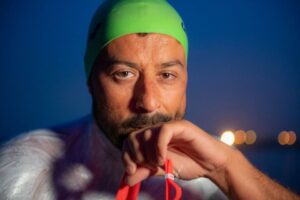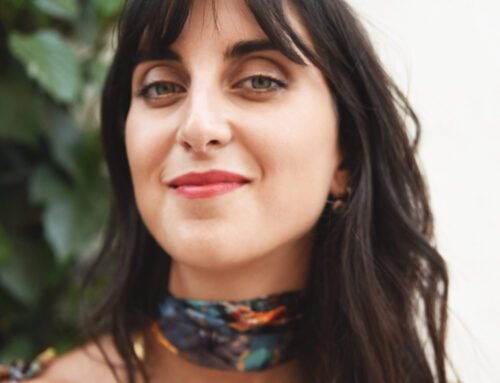
Swimmer and anti-pollution activist Neil Agius finished the breath-taking swim from Sicily to Malta for the Wave of Change campaign one week ago. Speaking about his experience on the biggest challenge he has taken on so far, he shares how he trained his mind and body to get himself into unknown waters. He started swimming at a young age, and he quickly developed a passion for fighting sea pollution. Neil also shares tips on avoiding single-use plastics and his thoughts on the future of his journey.
Hello Neil! Let’s cut right to the chase: you took on the challenge of swimming from Sicily to Malta. How long did it take you all-in-all?
The challenge of swimming from Sicily to Malta was the 100-kilometre distance and it was meant to take me approximately 33 hours. I managed to do it in 28 hours and 7 minutes.
How did you feel after having completed this challenge?
I was super excited and relieved that all the hard work that I put in wasn’t for nothing. Not only training and fitness wise, but also the hard work for the Wave of Change campaign. To see it plastered all over Facebook is a great feeling.
What was the most gruelling aspect of it?
I would say the nights. I usually love swimming at night and don’t mind it at all. But after the whole night, around three or four in the morning, I was already swimming for about 24 hours. My body started to feel really cold and I was uncomfortable, I needed things to change. So I wanted the sun to come up, and once it did it really made a difference. As soon as the sun came up, I was able to push through and really started to get my energy back, which was a big plus for me as it basically helped me get to the end.
You planned this swim from Sicily to Malta quite a while ago. How have you been training and preparing for the 100-kilometre journey?
Yes, I planned to swim from Sicily to Malta quite a while ago. I started preparing for the 100-kilometre swim in January, as soon as I came back from Brazil. The training was quite intense. Six times a week I did exceptionally long swims, building up from three to four hours to six to eight and eventually even ten to twelve hours of non-stop swimming. Apart from that, I took some Pilates classes and worked a lot on my mind by meditating and trying to clear my head and not have any thoughts go in and out of it. There really was a lot to the training.
When and how did your love for swimming start?
My love for swimming started at a young age. My parents used to send me to swimming lessons when I was younger, and I was quite good at it. You know how it is when you’re good and you kind of enjoy something, so I told my parents to take me more and more and things progressed from there. When I was older, I joined the national team and that’s when I started to train properly. So the love was there from a young age – I was incredibly lucky to have swimming in my life.
Your main goal is to raise awareness about the ever-growing issue of plastic pollution in the seas. Where does this passion come from?
Yes, the main goal was to raise awareness about the growing issue of plastic. The passion comes from us training to swim around Malta, as we spent a good number of hours in the sea. We used to see the seabed full of plastics and plastic bags. I mean, you see all sorts of things – wardrobes, washing machines, cupboards, gates, pretty much anything you can imagine at the bottom of the sea. So we really wanted to make people aware of it. When doing these long and big events, you have everyone looking at you, and that is when you can pass on a message. Wave of Change was the message that we wanted to pass on, to inspire people to reduce their plastic footprint.
This isn’t your first time swimming long distances – you swam around Malta in 22 hours with the same goal of raising awareness on pollution. What made you want to take it to the next level?
I would say two things really wanted me to take it further. Firstly the Wave of Change campaign, which really opened my eyes to bigger problems like single-use plastic. I already knew about the issue, but it shocked me to realise that it is even worse than it looks on the surface. Secondly, once I did the swim around Malta something kind of clicked. I was curious to see how much longer I can swim for, how much further I can swim, and when too much is too much. I was and still am really interested in taking my body and mind into unknown waters. To see how far I can push it, how far I can get my mind to control my body and be able to do these long swims.
Besides your activism for the Wave of Change, you represented Malta in the 2004 Olympics in the 400m freestyle. Do you prefer long or short distance swimming?
Back in 2004 I participated in the Olympics in Athens. As I grew older, I preferred longer distances. When I was a pool swimmer when I was younger, the longest swim I did was 1500m, and that was the main event. I was the national record holder for that, as well as for the 800m and 400m. But yes, the longer events are my preferred events as I can really zone out and get into my own stride – I get into a meditative state.
What do you do personally do and recommend to others to reduce plastic usage?
It’s the simple things, really. Open your cupboards and fridge and check out which plastic you use has alternatives. You see single-use plastic bottles, your ham wrapped in a plastic bag, or your vegetables wrapped in separate plastic bags. These are things you can prevent from happening. There are either alternatives to the single-use bottles by having reverse osmosis or the bigger refillable drinking water bottles. Use of plastic bags is easily avoidable. Another thing you can do is plan ahead when you go out. If you’re going for a picnic, take enough water and a bag with you so you don’t leave a rubbish footprint behind. Those are the two things I would really recommend.
Do you have any plans for future challenges or are you taking it easy for a while?
After a long swim like this you need to let your body recover, as it’s not as healthy as you would imagine after putting yourself through something like that. But the journey that I am on has just started, I wouldn’t even say it’s halfway. So there are more swims to come. What they are exactly I’m not sure about, but eventually it will come to me and we will have another challenge and another day to test myself and my mind.
Activists like Neil Agius spread awareness on how to turn the tide on plastic pollution. To prevent plastics from ending up in our beautiful seas, every little act counts. Become a wavemaker yourself and join the Wave of Change movement, empowering yourself and others to take action against plastic waste. Read more on waveofchangemalta.com.
Image: Kurt Arrigo Photography



